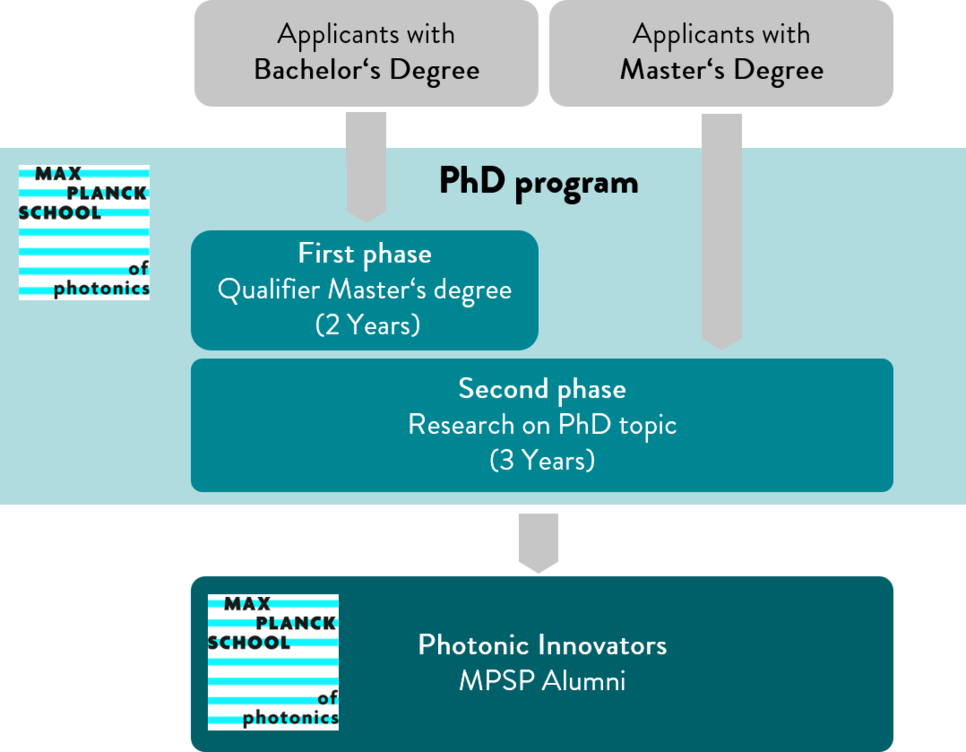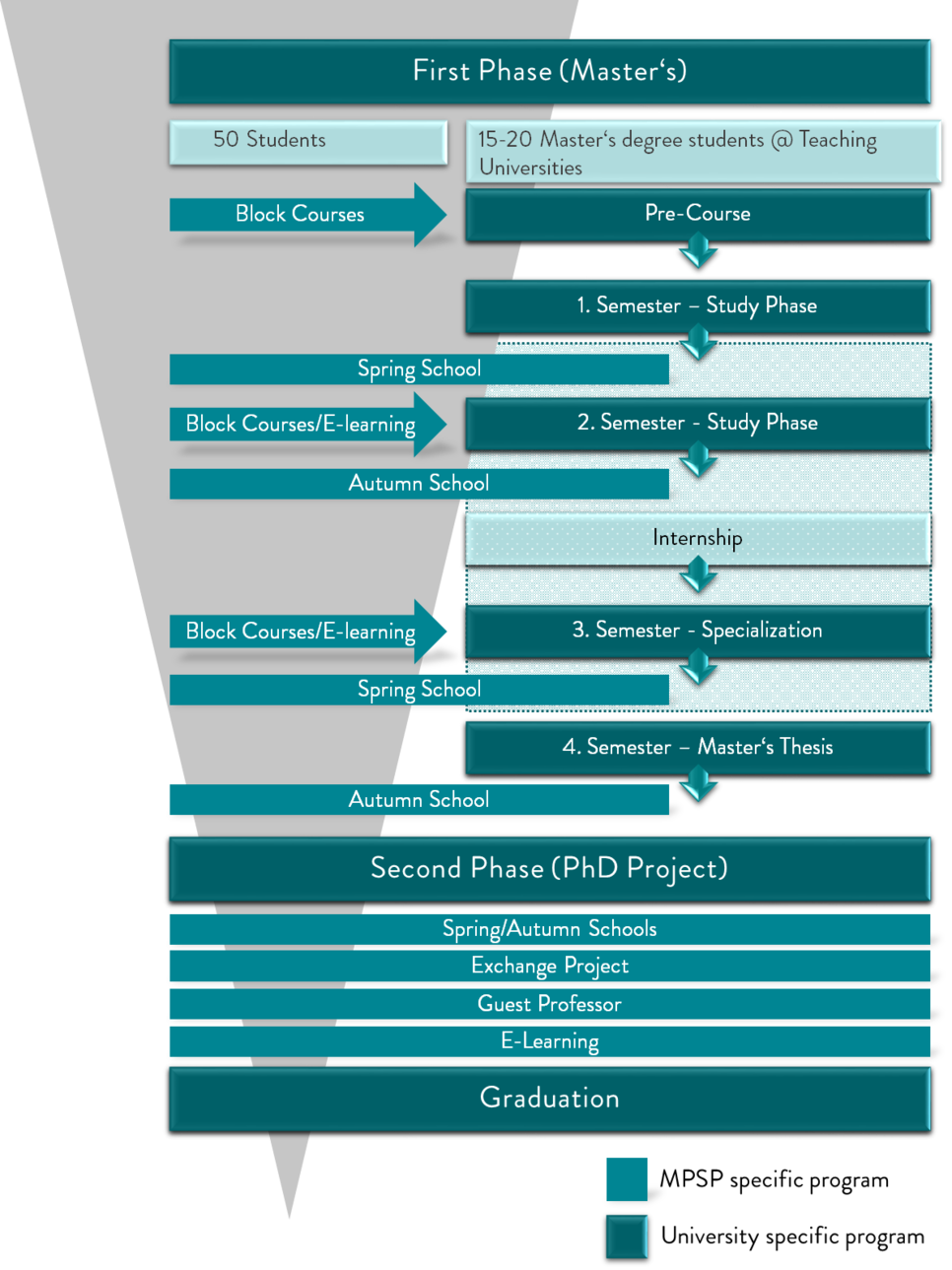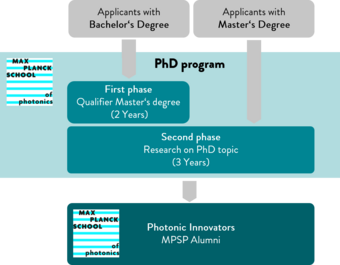FAQs
General information
Prerequisites
Application process
Life in Germany
What is the Max Planck School of Photonics?
The Max Planck School of Photonics is a graduate school offering a two-phase PhD program.
-

In the first phase, successfull applicants pursuing or holding a Bachelor’s degree obtain a Master’s degree from one of three teaching universities in Erlangen, Jena, or Karlsruhe. The first phase has a duration of two years and, if completed successfully, directly qualifies for entering the second phase.
-
The second phase is the research work on a PhD project. The main criterion for an applicant entering the second phase is a Master's degree in a subject with sufficient exposure to physics. The PhD project is conducted in a group of one of the MPSP-Fellows under the supervision of this Fellow. The MPSP-Fellows are distributed amongst seven locations in Germany. Students can apply to any of the Fellows’ research topics. Changing locations between first and second phase is evaluated positively and emphasizes the network character of the school. The second phase of the program has a planned duration of three years.
How are the first and second phases of the program connected?
After the first year of the first phase (Master’s), the student’s performance is evaluated by the selection committee. This committee is recruited from the MPSP-Fellows and supported by the MPSP-Office. If the performance exceeds a threshold value the student enters the second phase. The student identifies potential research topics during the third semester and applies for the respective MPSP-Fellow’s position via the online application portal. The research topics of Master’s thesis and PhD research may have a topical overlap to smoothly step from the first into the second phase. However, a change of the research topics should generally be possible.
What is the general program of the MPSP?

During the first phase (Master’s degree) of the program, the students participate in regular Master’s degree programs centered around photonics and offered by the three teaching universities.
Additionally, the MPSP offers block courses for the development and advancement of scientific and social skills. Further, the MPSP offers spring and autumn schools to prepare the students for their PhD research activities, and to foster the matching of students and prospective MPSP-Fellows and PhD supervisors. Participation in the block courses and schools is partly mandatory for MPSP students, details will be formulated and signed by the students upon accepting their study grants. The students are encouraged to conduct their curricular internships and Master's theses at different locations of the MPSP network. Such exchange projects may be understand as an opportunity for MPSP-Fellows not involved in teaching in the first phase, because it will allow them to get into contact with and seize prospective PhD students before Master's graduation.
During the second phase, the students focus on the scientific work for their PhD project in the research groups of their supervising MPSP-Fellow. They will also be assigned a co-supervisor, ideally at another university (see “What are the expectations towards supervision of students?”). The final academic degree (usually Dr. rer. nat. or Dr.-Ing.) will be awarded by the university of the supervising MPSP-Fellow. The individual procedure is defined by the local academic PhD regulations. Students are strongly encouraged to conduct short- or mid-term research stays at the group of their co-supervisor during their PhD project.
Additionally, all students have to attend additional modules offered by the MPSP. In order to establish and maintain a strong network between students at all qualification levels and the MPSP-Fellows, students in the second phase also participate in the spring and autumn schools as well as in courses for the development and advancement of scientific and social skills. Again, these activities will be partly mandatory for all students of the second phase and the regulation will be subject to agreements signed by student and supervisor. Because of the broad distribution of students all over Germany, courses during the second phase will be provided largely by E-Learning modules.
How many students are in the school?
Yearly, we accept 20 students for the program in the first phase (Master’s studies) and 40 students for the second phase (PhD project). In total, this will amount to approximately 40 students in the first phase and 120 the second phase.
Who can apply for the MPSP program?
Bachelor’s degree graduates or Bachelor’s degree students expecting graduation before the start of the program in October of the following year can apply for the MPSP program starting with the first phase (Master’s degree).
Master’s degree graduates or Master’s degree students expecting graduation before the start of the program in October of the following year can apply directly for the second phase (PhD project) of the MPSP program.
More information on the required documents is available here.
How to apply for MPSP?
The application process will be possible via an online platform (available from November 1st). There, applicants will fill in their personal information and submit relevant documents including school leaving certificates, certificates of Bachelor’s and Master’s degree studies, a comprehensive curriculum vitae, a letter of motivation, two letters of recommendation, a proof of English language proficiency, and GRE score (if available, general test or physics subject test).
The application portal has two tracks. One track is for applicants with Bachelor’s degree that want to enter the first phase (Master’s degree) of the program. During the application process, preferences for the teaching university can be indicated. The second track is for applicants with Master’s degree that want to enter the second phase (PhD project) of the program as part of the 1st or later Cohorts. Here, students apply directly for up to five research topics supplied by the MPSP-Fellows.
What is the funding for students?
During the first phase of the program, Master’s degree students receive stipends of 1’365 Euro plus 100 Euro for health insurance (if applicable) and additional 200 Euro bonus per month from the Max Planck Society. During the second phase (PhD project) of the program, the students are employed by the university or research institute of the respective MPSP-Fellow with a full position (E13, 100%).

